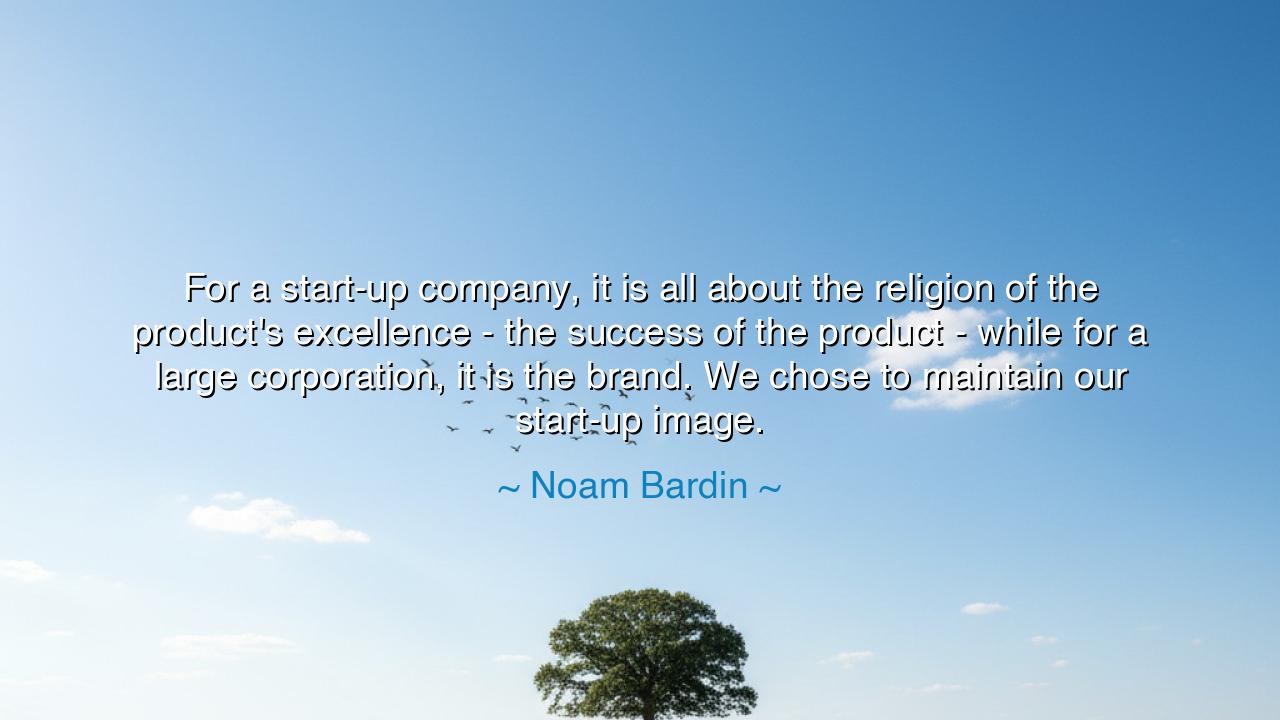
For a start-up company, it is all about the religion of the
For a start-up company, it is all about the religion of the product's excellence - the success of the product - while for a large corporation, it is the brand. We chose to maintain our start-up image.






"For a start-up company, it is all about the religion of the product's excellence - the success of the product - while for a large corporation, it is the brand. We chose to maintain our start-up image." These words, spoken by Noam Bardin, capture the essence of the difference between the early days of a company and its more established phase. At the heart of Bardin’s statement is a reflection on the values that guide an organization’s evolution. For a start-up, the focus is often on the pursuit of excellence—creating something of extraordinary value, something that stands out and makes a lasting impact. Yet, as the company grows and becomes a large corporation, the focus shifts to the brand—a symbol that encompasses not just the product but the entire identity of the company, its reputation, and its place in the market. Bardin’s choice to “maintain our start-up image” suggests a commitment to the principles of innovation, creativity, and the relentless pursuit of product excellence, even as the company grows.
The ancient wisdom of the Greeks and Romans is rich with lessons on the importance of excellence and reputation. In the time of Plato and Aristotle, philosophers valued the idea of arete, which translates to excellence in all aspects of life—be it in moral virtue, intellectual pursuits, or physical strength. A person, or by extension a business, was considered to be truly great only if it constantly strove for excellence and sought to fulfill its highest potential. Plato’s ideal society was one where individuals, like craftsmen or warriors, honed their craft with precision and dedication, seeking the perfection of their respective roles. This relentless pursuit of quality was seen as an honor, and much like Bardin’s focus on product excellence, it was the core of a flourishing endeavor.
In more recent history, the rise of Apple Inc. serves as a powerful example of the value of maintaining the start-up image of excellence even as the company grew. Steve Jobs was famously obsessed with creating products that were not only functional but beautiful and innovative. For Jobs, Apple’s product excellence was its religion. He cared deeply about the details—the feel of the product in your hand, the elegance of its design, the simplicity of its interface. This dedication to product quality became the driving force of Apple’s success and brand loyalty. While Apple did, of course, develop into a massive corporation, it never lost sight of its start-up spirit—its obsession with innovation and product excellence. This pursuit of excellence, not just for the sake of profit but for the sake of delivering something meaningful to the world, is a core principle that keeps start-ups dynamic and impactful, no matter how big they become.
However, as companies grow, the shift towards branding becomes inevitable. Coca-Cola, Nike, and McDonald’s—all of these massive corporations were once small start-ups driven by the vision of creating a superior product. Yet, over time, their success moved beyond the product itself and into the brand—the image that these companies project. A brand is no longer just about a specific product, but about the emotions, the lifestyle, and the culture it evokes. For a large corporation, the brand becomes the identity—an image that must be protected, maintained, and marketed. Bardin’s words serve as a reminder that while branding may be essential for the survival of large corporations, the soul of any company should lie in the constant pursuit of excellence, not in the creation of a polished image alone.
This distinction between product excellence and branding is crucial for any entrepreneur or leader. The tension between these two ideals is often the battleground of a company’s evolution. When a company loses sight of its initial vision—its drive for product excellence—in favor of just building a brand, it risks losing the authenticity and innovation that made it successful in the first place. The lesson from Bardin’s choice to maintain a start-up image is that no matter how large a company becomes, it should never forget the core principles of its early days—the commitment to quality, the focus on the product, and the passion for creating something new.
For us, the lesson is clear: whether in business, art, or life, we must always strive for excellence in what we create, never losing sight of the fundamental values that drive us. As we grow, it is important to maintain the spirit of the start-up—the relentless pursuit of innovation and improvement. At the same time, we must understand that branding and identity are important too, but they should never replace the core mission of making something remarkable. Whether you are building a business, a project, or your own personal journey, let excellence be your guide, and let it remain at the heart of everything you do.
Thus, we must embrace both the drive for excellence and the necessity of branding, recognizing that true success lies in balancing the two. Let us carry forward the start-up mentality, constantly challenging ourselves to be better, to create more, and to push the boundaries of what is possible. By doing so, we honor both the legacy of the past and the potential for the future, ensuring that our contributions to the world are driven by a deep commitment to quality and authenticity.






AAdministratorAdministrator
Welcome, honored guests. Please leave a comment, we will respond soon